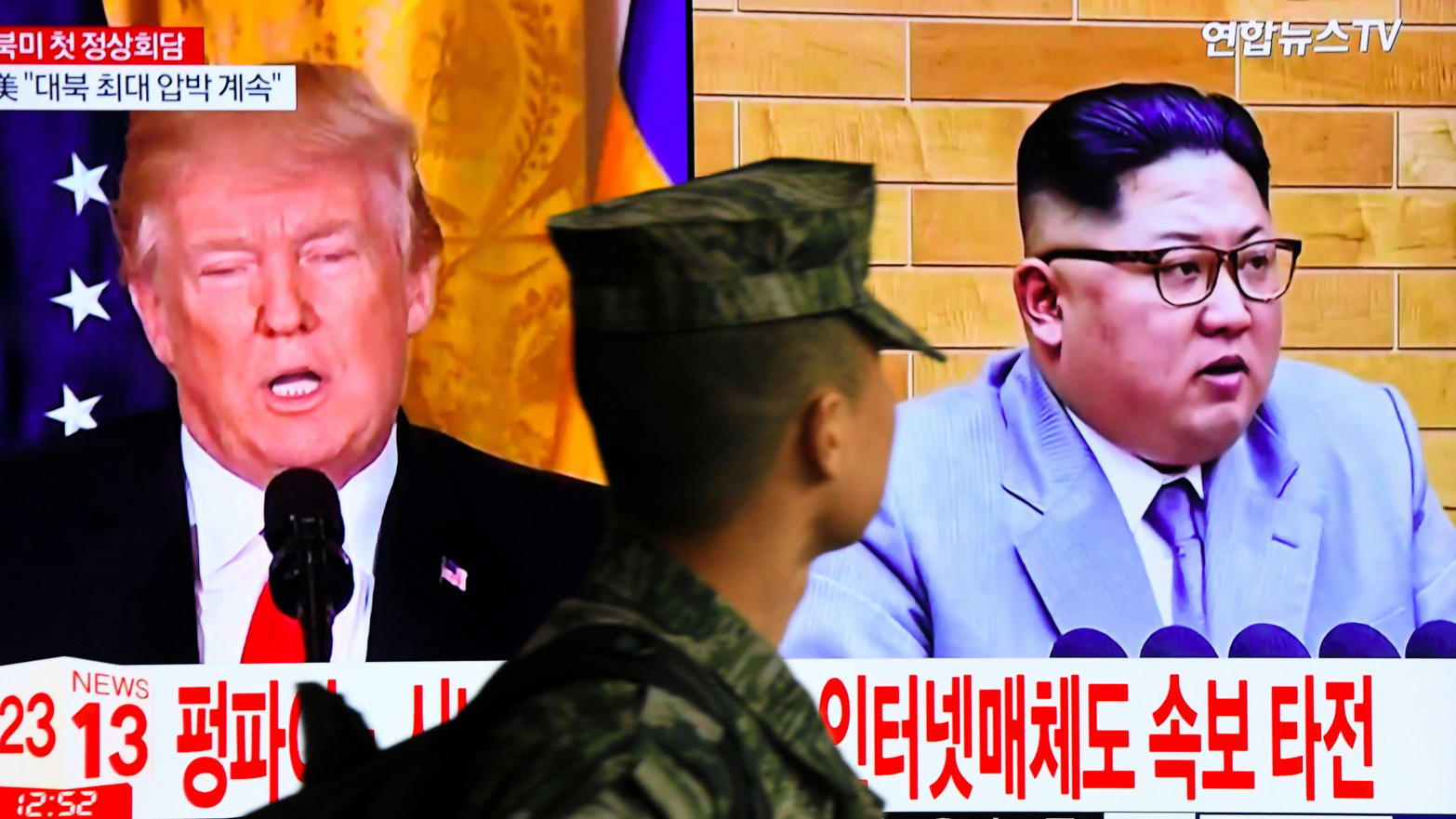HANOI—Donald Trump, who once famously said he and Kim Jong Un “fell in love” after their tryst in Singapore last June, announced the failure of their second summit in the same time-honored words that have terminated many a great love affair. “We’ll end up being very good friends,” he said.
In practical terms, the negotiations here came to an abrupt halt Thursday after it became obvious both sides were getting nowhere with any of their demands.
But Trump told a press conference afterward that he still took Kim at his word when he said he would not be testing nuclear weapons or missiles. He even said he believed the North Korean leader’s claim that he had no idea American student Otto Warmbier was being treated so brutally in Kim’s prisons that he was in a coma when released and died soon afterward. The other hostages “came back extremely healthy,” Trump said. But Warmbier? “I don’t believe [Kim] knew about it.... He tells me that he didn’t know about it.... I take him at his word.”
The Hanoi meltdown came as a shock after predictions on all sides that the two would surely issue a statement, however meaningless, pledging some semblance of cooperation beyond the vague commitment to “denuclearization” they signed after their initial summit in Singapore in June.
This time around, there were no boasts about the end of the North Korean nuclear threat and there is no clue, really, about where the U.S. and North Korea will go from here.
The best face Trump could put on it was to say that talks would continue— and he would keep shilling for North Korea as a great development prospect.
In concrete terms, the most that Trump could extract from Kim before walking out early from their meeting in the historic Metropole Hotel was the impression—not a guarantee—that Kim is not about to order more tests of nuclear warheads and long-range missiles as last conducted in 2017.
The summit broke down over the basic issue of sanctions versus denuclearization.
Kim demanded a complete end to sanctions that the U.S. and U.N. had imposed after those tests, and Trump refused to budge without a firm agreement that North Korea at last would get down to actually getting rid of its nuclear program, not just making token gestures in that direction.
Trump put on the table the U.S. call for closure of the North’s central nuclear site at Yongbyon, 60 miles north of Pyongyang, along with a list of many other sites hidden away elsewhere in North Korea, and surrender of all the nuclear weapons, probably a few dozen, fabricated so far.
According to Trump at a press conference in the afternoon, Kim agreed to some action on Yongbyon, but not in the other areas that interested the administration.
Clearly Kim was in no mood to listen to stuff from Trump about all the rewards that would be showered on the North if only Kim would come around.
“To me it’s pretty obvious, they have to denuclearize,” Trump said at a press conference that lasted only about 40 minutes, less than half the time of his rambling remarks after the Singapore summit. “There’s tremendous potential in North Korea. It’s going to be an absolute economic power.”
Maybe so, but the Kim dynasty has heard all this before. Kim's father, Kim Jong Il, who died in 2011, was promised billions in aid from South Korea if only he would please denuclearize. Nope.
Trump went to considerable lengths to make clear neither he nor Secretary of State Mike Pompeo, with him at the summit, slammed fists on the table, or even showed visible anger, before cutting off the conversation. “I want to keep the relationship,” he said. “We’ll see what happens.”
Nonetheless, there was no gainsaying the simple fact that the American team had staged a walkout.
In fact, Trump was so eager to make that point about knowing when "to walk away" that he decided to talk to the media at exactly the time when he and Kim were to have sat down to a farewell luncheon.
Then Trump impatiently wrapped up his remarks at the J.W. Mariott hotel saying he had to get on his plane and “fly back to a wonderful place, Washington D.C.” (Surely a touch of irony in that, since he knew his former lawyer had upstaged him with testimony before Congress on Wednesday, calling Trump a con man, a liar, and a racist.)
“We couldn’t give up all the sanctions,” said Trump at the outset of the press conference. “We had to walk away from that.”
Asked how he would describe the different views or what denuclearization actually means to Kim and to him, Trump said, “He has a certain vision, it’s not exactly our vision,” but at least they were “a lot closer than a year ago.”
“There is a gap,” he went on, not quite rambling but wanting to leave no doubt about the problem. “We have to have sanctions…. We have to get where we want go.”
Just how far that goal now stands is clear from the many baby steps that this summit failed to take.
There was, for one thing, no talk about an “end-of-war declaration,” as the North Koreans and South Korea’s President Moon Jae-in had both wanted, bringing closure to the Korean War that had really ended in a truce in July 1953.
Nor, much less, was there any mention of an actual peace treaty—a step that would give the North Koreans an excuse to demand an end to the U.N. Command under which U.S. and South Korean forces, and troops from 16 other countries, fought the Korean War.
Oh, and there was no mention of the U.S. and North Korea setting up liaison offices in each other’s capitals—although that remains a possibility depending on the outcome of lower-level talks.
One indication of still more trouble ahead was Trump’s awkward equivocation about future U.S.-South Korean joint military exercises, one round of which were cancelled after Singapore.
As he often does, Trump complained that military costs were high and American allies should pay more to the U.S. to defend them. The games “cost us $100 million every time,” he said. “South Korea should help us on that.”
But would he want to give up the next round of war games? “I am saying they are very, very expensive,” he said to suggest why he had shocked the Pentagon by ordering their suspension right after the Singapore summit, but might not be doing so this year.
Although the love may be gone, curiously Trump’s expressions of trust when dealing with Kim remain.
Thus he seemed reassured by the North Korean’s promise he was “not going to do testing.” And when asked how he could keep calling Kim a “friend” given the horrible and finally fatal abuse suffered by American student Otto Warmbier in 2016 and 2017, Trump said “bad things happen” in North Korean prisons.
But Trump assured the press Kim “tells me he didn’t know” about what was happening to Warmbier—and “I will take him at his word.”
Trump reserved his real outrage for his one-time attorney, Cohen, whose testimony before a House committee was broadcast live early this morning while Trump presumably was getting psyched up for the summit. Trump said he only watched a little of it. “Having a fake hearing like that in the middle of the summit,” he said, was “terrible.”
Cohen’s description of Trump as a con man and a cheat might not be the worst attributes for a president dealing with North Korea, in fact, but at this summit neither Trump nor Kim were able to con one another.
The differences between the U.S. and North Korea were as sharply defined as they had ever been under all those presidents before him, whom Trump continues to blame for failing to come to terms with North Korea. As he may have finally learned, that’s a lot easier said than done.

